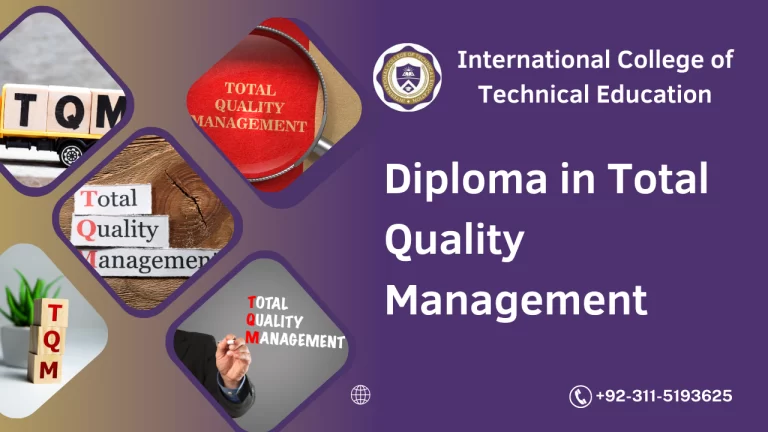The Diploma in Quality Control is a comprehensive program designed to equip individuals with the necessary knowledge and skills to ensure product and process quality in various industries. This course offers in-depth training in quality control principles, methodologies, and tools, empowering students to identify and rectify defects, maintain product consistency, and improve overall efficiency. Through a combination of theoretical lectures, practical exercises, and case studies, students will gain a solid foundation in quality management and develop the expertise needed to contribute effectively to any organization’s quality assurance efforts.
Course Benefits:
Completing the Diploma in Quality Control offers numerous benefits to participants, including:
- Enhanced Career Opportunities: Graduates will be equipped with sought-after skills that are highly valued in industries such as manufacturing, healthcare, pharmaceuticals, automotive, and more. This diploma opens up a wide range of career opportunities as quality control analysts, inspectors, coordinators, and managers.
- Quality Management Expertise: Students will gain a deep understanding of quality control principles, methodologies, and best practices. This knowledge can be applied across various domains to optimize processes and improve product quality.
- Real-World Applications: The course emphasizes practical training, allowing students to work on real-world projects and case studies. This hands-on experience ensures that graduates are well-prepared to tackle quality challenges in actual work settings.
- Industry-Recognized Certification: Successful completion of the course grants participants an industry-recognized diploma, adding significant value to their resumes and enhancing their employability.
- Continuous Improvement: Quality control professionals play a crucial role in driving continuous improvement initiatives within organizations. This course imparts the skills needed to identify improvement opportunities and implement effective strategies.
Course Learning Outcomes:
Upon completion of the Diploma in Quality Control, students will be able to:
- Understand Quality Control Principles: Comprehend the fundamental principles of quality control and their significance in ensuring product and process quality.
- Apply Quality Tools and Techniques: Utilize various quality control tools such as statistical process control, Six Sigma, and Lean principles to analyze data, identify defects, and implement process improvements.
- Conduct Quality Inspections: Perform product inspections and develop quality inspection plans to maintain consistent product quality.
- Implement Quality Management Systems: Develop and implement quality management systems to ensure adherence to quality standards and regulations.
- Root Cause Analysis: Apply root cause analysis techniques to identify the underlying reasons for defects and implement corrective actions.
- Quality Auditing: Conduct internal audits to assess compliance with quality standards and identify areas for improvement.
- Quality Documentation: Create and maintain quality-related documentation, including standard operating procedures (SOPs) and work instructions.
Course Study Units:
- Introduction to Quality Control
- Quality Control vs. Quality Assurance
- History and Evolution of Quality Control
- Importance of Quality Control in Different Industries
- Quality Control Tools and Techniques
- Statistical Process Control (SPC)
- Six Sigma Methodology
- Lean Principles and Techniques
- Failure Mode and Effects Analysis (FMEA)
- Quality Standards and Regulations
- ISO 9001:2015 and Quality Management Systems
- Regulatory Compliance and Industry-specific Standards
- Good Manufacturing Practices (GMP)
- Inspection and Testing
- Sampling Techniques and Plans
- Inspection Methods and Procedures
- Non-Destructive Testing (NDT)
- Root Cause Analysis and Corrective Actions
- Problem-Solving Techniques (5 Whys, Fishbone Diagrams, etc.)
- Corrective and Preventive Actions (CAPA)
- Quality Auditing
- Internal Audits and Auditing Process
- Audit Planning, Execution, and Reporting
- Corrective Action Management
- Document Control and Process Improvement
- Document Management and Control
- Continual Improvement Methods
- Total Quality Management (TQM)
Entry Requirements:
To enroll in the Diploma in Quality Control, candidates must meet the following entry requirements:
- High School Diploma or equivalent qualification.
- Basic knowledge of mathematics and statistics.
- Good communication skills, both written and verbal.
Future Progressions:
After completing the Diploma in Quality Control, graduates can pursue various paths to advance their careers:
- Advanced Quality Control Courses: Individuals can opt for advanced courses or certifications in Six Sigma Black Belt, Quality Management Systems Lead Auditor, or Lean Six Sigma Green Belt to deepen their expertise.
- Bachelor’s Degree: Graduates may choose to pursue a Bachelor’s degree in Quality Management, Industrial Engineering, or a related field to further enhance their qualifications and career prospects.
- Quality Control Managerial Roles: With experience, individuals can progress into managerial positions, such as Quality Control Manager, where they oversee quality control activities across an organization.
- Industry Specialization: Graduates can specialize in specific industries such as healthcare, aerospace, or electronics, applying their quality control skills to specific product lines or services.
- Continuous Professional Development: Staying updated with the latest advancements and trends in quality control through workshops, seminars, and webinars will ensure continuous professional growth and competitiveness.
Conclusion:
the Diploma in Quality Control offers a comprehensive curriculum that equips students with essential knowledge and skills to excel in quality control roles across various industries. With a focus on practical training, industry relevance, and continuous improvement, graduates of this program are well-prepared to contribute to the success and quality of any organization they work for.







